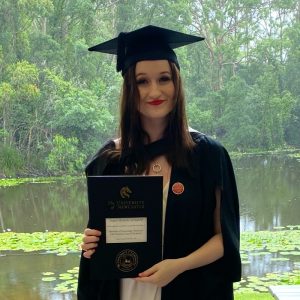

Tegan Stettaford
Tegan Stettaford is a 3rd year PhD Candidate and Associate Lecturer at the University of Newcastle. Her present PhD research centres around a cluster randomised controlled trial, being conducted across 3 Local Health Districts within NSW; we aim to improve the provision of preventive care in participating services, via the implementation of a dedicated role and integrated ongoing care for clients. It is hoped that this will improve the physical health of people with a mental health condition by targeting key chronic risk factors: smoking, poor nutrition, harmful alcohol consumption, physical inactivity, and weight. Tegan’s specific focus is on client experience and engagement with the intervention.
Abstract
Title: Experiences of people with a mental health condition using a telephone health coaching service to support healthy lifestyle changes
Author(s): "Tegan Stettaford1,2,3, Caitlin Fehily1,2, Belinda Jackson1 , Elizabeth Campbell2,3,4, Vibeke Hanson, Julia Dray, Joanna Latter1, Jenny Bowman1,2
Affiliations:
1- School of Psychological Sciences, The University of Newcastle, Callaghan, NSW 2308, Australia
2- Hunter Medical Research Institute, Clinical Research Centre, New Lambton Heights, NSW 2305, Australia
3- School of Medicine and Public Health, The University of Newcastle, Callaghan, NSW 2308, Australia
4- Hunter New England Population Health, Wallsend, NSW 2287, Australia"
Introduction: Telephone coaching services represent one way to support people in making healthy lifestyle changes, at a population level. These services could provide much-needed support for people living with mental health conditions. The Get Healthy service is one such service that provide telephone-based coaching to assist with various areas of behaviour change, such as Nutrition, alcohol consumption, and physical activity engagement. This study explored experiences and perspectives of the Get Healthy Service (GHS) Coaching Program among people with a mental health condition.
Method: A qualitative research design was utilised, involving semi-structured interviews with 20 people who had a mental health condition and had used the GHS (from 24/04/2023 – 16/05-2023). Participants were recruited from a previous trial, across NSW, Australia. Inductive thematic analysis was employed during interview analysis.
Results & Findings: Preliminary results indicate 5 overarching themes: specific Mental Health considerations, Service Characteristics, Therapeutic Relationship, Personal Development, and Suggestions. Participants strongly regarded their Mental Health condition as a part of their whole self and acknowledge the barriers and impacts it has on everyday life, including medications influence on weight, symptom hindrance and the burden of stigma. Participants commented on the service, including processes, being restrictive but also flexible, staff being experts with great resources, but coaching calls not being tailored/adapted to support mental health. The Relationship between Coach and Participant fostered connection through person-centred rapport, allowing for physical health support. Participants completed the program with growth in areas of routine, learning and autonomy. Despite the successes, there were suggestions for improvement to better meet the needs of people with a mental health condition.
Discussion: The GHS hold potential in support healthy lifestyle change for people with a mental health condition, with many participants voicing no complaints. However, areas for improvement include additional Mental health training for staff and alteration to communication modes.